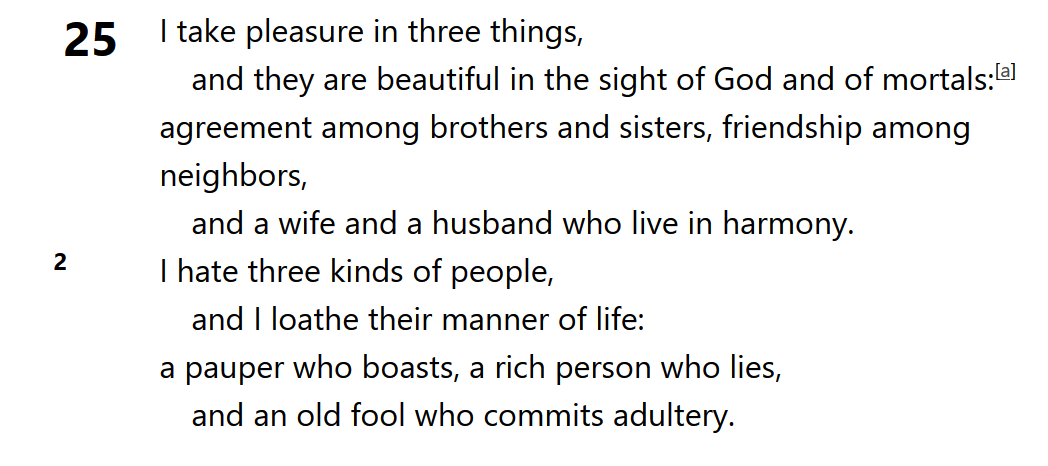
Ben Sirach 25:2 in the hadith literature.
Ex. 1 from Nasāʾī (sanad saḥīḥ)
"Four God despises: the seller given to making oaths, the boast pauper, the elderly adulterer, and the unjust Imam"

Ex. 1 from Nasāʾī (sanad saḥīḥ)
"Four God despises: the seller given to making oaths, the boast pauper, the elderly adulterer, and the unjust Imam"


Ex. 2 from Muslim (sanad saḥīḥ)
"Three whom God will not address nor absolve on the Day of Resurrection" - Abū Muʿāwiyah said, "nor regard them"- "and shall have a painful torment: an elderly adulterer, a lying man of property, and boastful pauper."
"Three whom God will not address nor absolve on the Day of Resurrection" - Abū Muʿāwiyah said, "nor regard them"- "and shall have a painful torment: an elderly adulterer, a lying man of property, and boastful pauper."

[sorry that I deleted the original thread; i had accidentally not included my translation of the Nasa'i hadith]
*boastful
Ben Sirach 30:1-3 didn’t become a ḥadīth, but below is the version from al-Mubarrad’s Kāmil who cites a "sage":
He who punishes/instructs his son when young will delight in him when grown.
He who punishes/instructs his son humiliates the one envies him.
archive.org/details/kamilo…

He who punishes/instructs his son when young will delight in him when grown.
He who punishes/instructs his son humiliates the one envies him.
archive.org/details/kamilo…


Ben Sirach 29:21 in the hadith lit.
Ex 1 from Tirmidhī (sanad ḥasan)
"A child of Adam has no right except to these items: a house to reside in, a garment to cover his nakedness, a sack of bread, and water."

Ex 1 from Tirmidhī (sanad ḥasan)
"A child of Adam has no right except to these items: a house to reside in, a garment to cover his nakedness, a sack of bread, and water."


Ex 2 from Aḥmad’s Musnad (ḍaʿīf according to Arnaʾūṭ)
"All but the shade of a home, a sack of bread, a garment to cover his nakedness, and water -- a child of Adam has a right to nothing in excess of these."
"All but the shade of a home, a sack of bread, a garment to cover his nakedness, and water -- a child of Adam has a right to nothing in excess of these."

• • •
Missing some Tweet in this thread? You can try to
force a refresh








